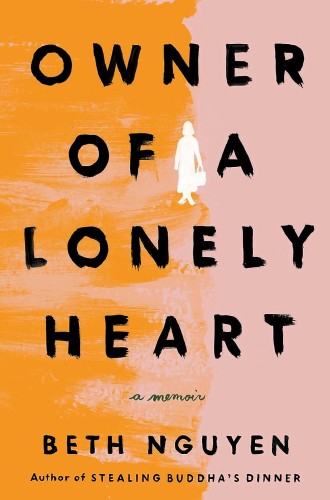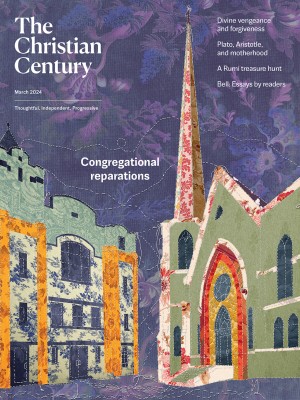A refugee’s lonely heart
Beth Nguyen’s second memoir is a deep dive into the void of a mother’s absence and the silence surrounding it.
“When I became a mother, I became a refugee,” writes Beth Nguyen, a gifted novelist whose stories come alive with Vietnamese American characters wrestling with the double consciousness familiar to all immigrants. In Owner of a Lonely Heart, her second memoir, she reflects on an incident that defined her before she knew herself. When she was eight months old, her father fled Vietnam with his daughters the day before Saigon fell (or as some would say, was liberated). They escaped with Nguyen’s uncles and grandmother but without her mother. For most of her life, Nguyen wondered whether her mother was left or chose to stay behind.
This memoir is a deep dive into the void of a mother’s absence and the silence surrounding it—a void that only intensifies when Nguyen becomes a mother herself and embraces her identity as a refugee. Nguyen invites readers into those private reflections and through the beauty of her writing helps us sit in the brilliance of that darkness.
Read our latest issue or browse back issues.
Owner of a Lonely Heart is about journeys toward unknown destinations. Refugees only know that they cannot stay; choosing where they will go is rarely an option. Parenting is in some ways a similar journey. We don’t know how things will turn out with our children. We just know that each passing day marks a moment we can never return to.
How do families make such decisions? In the case of fleeing a country, “You just know. You just go,” Nguyen’s heroic grandmother Noi told her when she asked. The family settled in Grand Rapids, Michigan. When Nguyen was three, her father married a Mexican American woman. She grew up in a blended household in a White town, where she endured the cruelty of growing up with her birth name, Bich (pronounced bick).
Nguyen eventually learned that her biological mother had fled to Boston. They reunited when Nguyen was 19, but since then they have spent fewer than 24 hours together. The book is punctuated by accounts of those mundane encounters, which leave readers wanting more. But “sensational reunions only happened in the worst movies,” Nguyen notes. Instead, she ushers readers along as she collects memories from those around her. Slowly, she pieces together her own story to make sense of her growing self-awareness as a mother. The book is rich with Nguyen’s insights on memory and forgetfulness in the context of motherhood.
Nguyen writes of profound losses and gains. She loses her biological mother at eight months but grows up with a stepmother whom she credits with saving her life. She tries to escape her identity as a refugee by blending in, but the unknowns of parenting put her back into “refugeetude,” a worldview marked by displacement and uncertainty. Her navigation of these feelings gives words to nearly every parent’s deepest insecurities.
Nguyen shows that “to be a mother is to be in a vague, permanent state of fear of loss,” a fear that is particularly tangible in our era of mass shootings. She also shows that the impending loss of parents will come to every child, no matter how much the parents protect them. As a child grows, the parents’ roles diminish—until one day the child is an independent adult. Parents lose even when we succeed. Yet it is a beautiful loss, one that we desire even when it pains us.
The elegance of Nguyen’s writing makes this memoir worth savoring. Her unique background gives readers a new lens by which to see familiar pains: loneliness, separation, loss, regrets, and the anxiety of living with the unknown. She puts into words what many of us barely let ourselves feel, and by naming those feelings she helps to heal wounds we did not know we had.
Owner of a Lonely Heart reminds us that we are shaped by absences and silence as much as the noise around us. While the song from which the book derives its name claims that owning a lonely heart is better than owning a broken one, Nguyen reevaluates what we call brokenness and creates hope that broken bonds can have meaning even if they are never mended to our satisfaction. This book is kintsugi of the heart in written form. Through her deep reflection and poetic prose, Nguyen helps us see beauty in the brokenness, at times making us wonder if it was broken at all.
Nguyen’s family arrived in the 1970s, at the start of a wave of Vietnamese refugees that would continue for decades. Before that, Cuban refugees flooded the shores of the United States, and before that, European refugees from World War II. Streams of refugees have found a home in the US since before this land was a nation. Today, refugees from Latin America are arriving, adding their stories to ours. None of these people set out to conquer. They set out to survive. Many were parents trying to ensure their children’s safety. Some, like Mary and Joseph, were forced to flee lest their child be killed. Internalizing refugee stories is and should continue to be part of the Christian tradition, because the origin story of Christianity is built on refugees.




